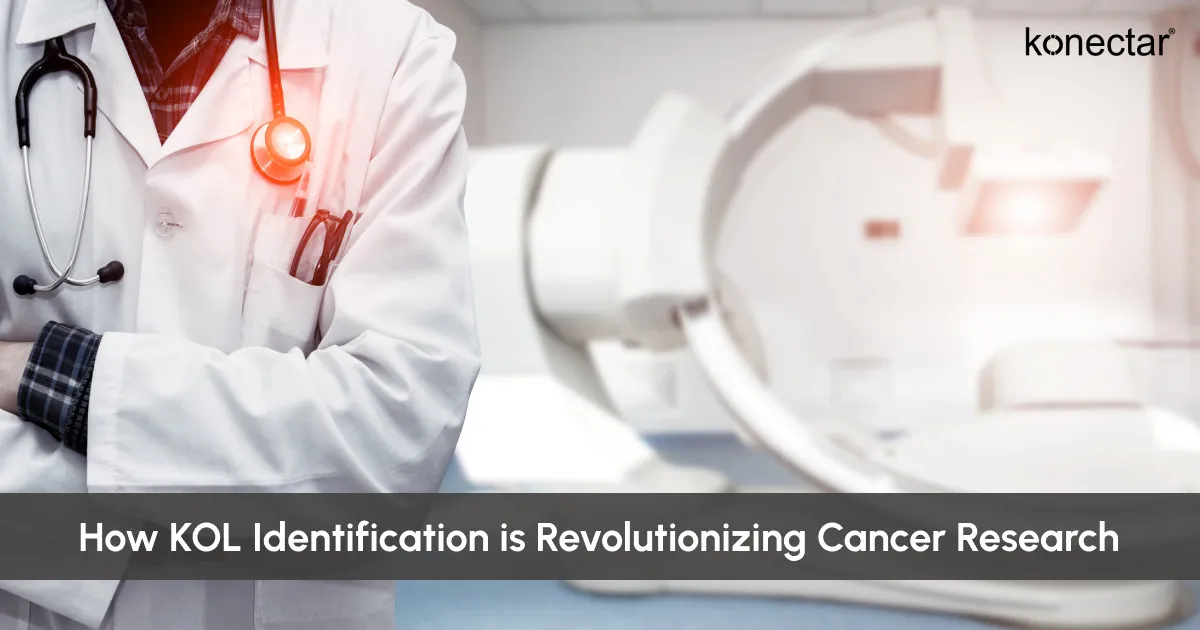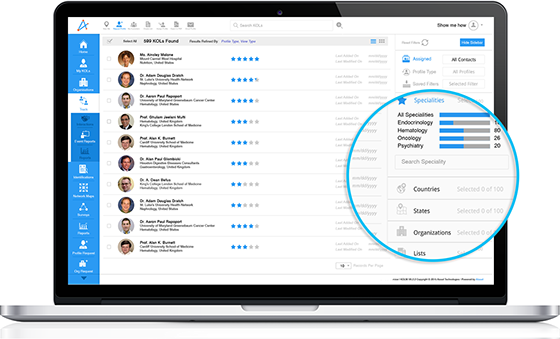27-03-2025
How KOL Identification is Revolutionizing Cancer Research

Significant progress has been made in cancer research due to scientific breakthroughs, technological innovations, and strong collaborations. One of the most transformative aspects of modern oncology research is the identification and engagement of Key Opinion Leaders (KOLs). These experts play an important role in guiding clinical trials, influencing treatment guidelines, and advancing our understanding of cancer therapies, including immuno-oncology and hematology research.
KOL identification is not just about recognizing the most published researchers; it involves tracking their real-time contributions and impact. This blog explores how accurate KOL identification can impact oncology clinical research, and how pharmaceutical and biotech companies can utilize these insights to drive progress.
In this article:
The Importance of KOL Identification in Oncology
Identifying the right KOLs is crucial for various stakeholders, including:
1. Efficient Allocation of Research Funds
Cancer research foundations operate with limited resources and must ensure that funding reaches the most impactful projects. KOLs help in this process by:
The scientific validity of research proposals.
The feasibility of experimental approaches.
The potential for real-world application and clinical translation.
Align research priorities with what will make a difference in clinical oncology.
Avoid investment in studies that have low translational potential (i.e., research that may not lead to viable treatments).
This ensures that cancer research funding does not just advance scientific knowledge but also improves patient outcomes.
a. Identifying Promising Research Areas
KOLs, particularly those with experience in oncology research and clinical trials, have deep insights into the most pressing challenges in cancer treatment. Their expertise allows foundations to prioritize research areas that are likely to yield breakthroughs.
Experts in lung cancer clinical trials can help identify gaps in treatment strategies, ensuring research is aligned with unmet needs.
b. Evaluating Grant Proposals
Cancer research organizations receive numerous grant applications, making it difficult to determine which projects will have the highest impact. KOLs provide valuable peer reviews, assessing:
This expertise ensures that funds are directed toward the most credible and promising projects, accelerating progress in oncology research.
c. Ensuring Clinical and Patient-Centric Relevance
KOLs bridge the gap between laboratory research and real-world patient needs. Their involvement helps:
2. Enhanced Public Awareness Campaigns
Public education is a critical component of cancer prevention and early detection. KOLs, as trusted voices in oncology, can significantly enhance awareness efforts.
Lead a public awareness campaign promoting regular mammograms.
Participate in media interviews to educate the public about lifestyle changes that reduce cancer risk.
Collaborate with cancer foundations to dispel myths about cancer treatments and new therapies.
Social media platforms allow them to share research updates, cancer prevention tips, and patient success stories.
Webinars and online forums enable them to engage directly with patients and caregivers, answering questions in real-time.
Collaborations with cancer research foundations ensure that trustworthy, evidence-based information is widely disseminated.
Working with government agencies to promote new screening guidelines.
Supporting funding initiatives for public cancer research programs.
Speaking at global oncology conferences to advocate for equitable access to treatments.
a. Credible and Influential Advocacy
When KOLs spread awareness about cancer prevention strategies, early screening programs, and emerging treatments, the public is more likely to listen and take action. For example, an oncologist specializing in breast cancer could:
b. Digital and Social Media Influence
With the rise of digital platforms, KOLs leverage their influence to reach a broader audience. Their presence on:
This results in higher awareness, better engagement, and improved health literacy among the general public.
c. Advocacy for Policy Changes and Public Health Initiatives
KOLs play an active role in influencing cancer-related policies by:
By aligning with cancer research organizations, KOLs help ensure that public health policies reflect the latest scientific advancements and address real-world patient concerns.
3. Stronger Collaborations Between Scientists, Clinicians, and Policymakers
Cancer research thrives on collaboration. KOLs serve as key connectors between different stakeholders in the oncology ecosystem, facilitating groundbreaking partnerships.
Oncologists – Provide insights into patient care and treatment effectiveness.
Molecular biologists – Develop cutting-edge therapies and drug targets.
Bioinformaticians – Analyze genetic data to personalize treatments.
Pharmaceutical experts – Guide drug development and clinical trials.
Evaluating industry-led clinical trials to ensure ethical and scientific rigor.
Connecting industry sponsors with top research centers for collaborative projects.
Guiding patient recruitment strategies for clinical trials to improve participation rates.
These collaborations help bring novel cancer treatments to market faster while maintaining scientific integrity.
Faster drug approvals – By providing evidence-based recommendations to regulatory bodies.
Better healthcare policies – Ensuring that cancer treatment guidelines are up-to-date with the latest research.
Increased research funding – Advocating for government investment in oncology research and clinical trials.
a. Building Multi-Disciplinary Research Networks
Cancer treatment requires expertise from various fields, including:
b. Creating Industry-Foundation Partnerships
Many cancer foundations partner with pharmaceutical and biotech companies to advance clinical research. KOLs play a vital role in:
c. Influencing Regulatory and Healthcare Policies
KOLs act as trusted advisors to policymakers, helping shape national and global cancer research strategies. Their expertise contributes to:
Using konectar for Driving Life Sciences Objectives
By leveraging konectar’s AI-powered KOL identification platform, organizations can efficiently identify key oncology leaders with precision, ensuring the right collaborations for advancing cancer treatment. konectar’s data-driven insights empower pharmaceutical firms, biotech companies, and research organizations to drive impactful clinical trials and accelerate breakthroughs in cancer research. Ready to discover how konectar can enhance your KOL identification process? Request a demo today!
FAQs
- What is a Key Opinion Leader (KOL) in oncology?
A Key Opinion Leader (KOL) in oncology is a recognized expert in the field of cancer research or treatment. KOLs play a critical role in identifying research priorities, evaluating clinical data, and advocating for policy changes.
-
How does KOL identification impact cancer research?
KOL identification helps cancer research organizations and pharmaceutical companies engage the right experts. By identifying influential KOLs, organizations can prioritize high-impact research, enhance public awareness, and drive stronger collaborations among scientists, clinicians, and policymakers.
-
Why are AI-driven platforms becoming crucial for KOL identification?
AI-powered platforms like konectar provide real-time insights into KOLs' contributions and impact, allowing for a more accurate and data-driven approach to KOL identification. AI algorithms analyze vast amounts of data to identify the most influential figures in oncology, saving time and resources while ensuring that the right collaborations are established.
-
How can KOLs influence public awareness of cancer prevention?
KOLs, through their authority and expertise, can lead public awareness campaigns, share evidence-based information, and advocate for early screening and cancer prevention strategies. Their influence on digital platforms and in public health initiatives helps educate the broader public and improve cancer literacy.
-
How does konectar assist in KOL identification?
konectar analyzes real-time data across various sources to identify KOLs based on their contributions, publications, and influence. By leveraging these insights, organizations can engage the right experts, build strategic partnerships, and drive progress in various therapeutic research and clinical trials.





